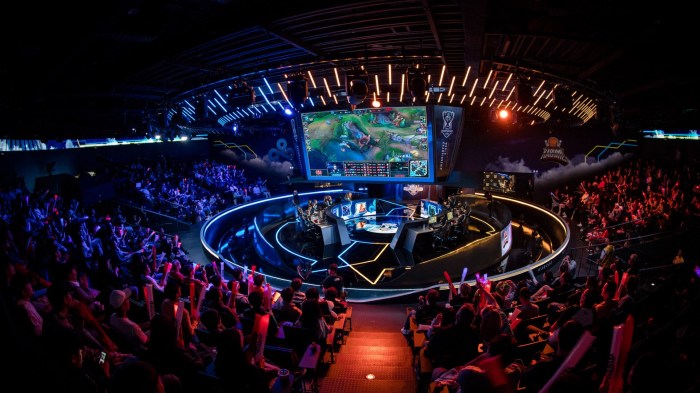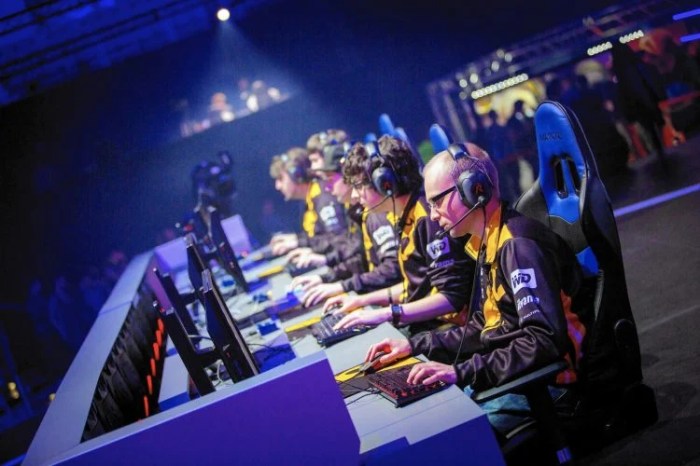
Esports tournaments, where virtual gladiators meet to battle for glory and digital gold, are essentially the Super Bowl of the gaming universe. These aren’t just your casual weekend matches; they’re grand events filled with strategy, teamwork, and the occasional rage-quit that keeps fans on the edge of their gaming chairs.
In the world of esports, tournaments take many forms, from single-elimination sprints to round-robin marathons, each designed to showcase the best of the best. With big-name sponsors pouring in cash, the stakes are higher than ever, and the competition is fierce. So, grab your controllers and get ready to dive into this digital arena!
Understanding Esports Tournaments

Esports tournaments are the gladiatorial arenas of the digital age, where players compete not with swords and shields, but with keyboards and controllers. These events have turned gaming into a spectator sport, attracting millions of viewers and substantial financial backing, highlighting their significance in the rapidly growing gaming industry. Tournaments serve as the battleground for teams and individuals to showcase their skills, vie for glory, and claim the coveted prize money while causing the occasional keyboard to be thrown in despair.The formats of esports tournaments vary widely, providing a dynamic landscape for competition.
Each format has unique characteristics that cater to different game types and player preferences. Understanding these formats is essential for both players aiming for victory and fans cheering from the sidelines.
Tournament Formats
Esports tournaments typically employ several competitive formats, each with its own rules and structure. Here’s a rundown of the most common formats that keep players on their toes and spectators on the edge of their seats:
- Single-Elimination: In this format, teams face off in a knockout system. One loss sends players packing, much like a bad first date. This format is simple and quick, ideal for determining a champion in a flash, though the risk of an unexpected upset looms large.
- Double-Elimination: Think of this as the safety net for those who are just having an off day. Players can lose once and still stay in the tournament, allowing them a second chance to prove their skills. It’s like having a backup plan when you forget your lines in a school play—always a good idea!
- Round-Robin: Here, every team plays against all the others, ensuring that everyone gets a fair shot to strut their stuff. This format can be time-consuming but provides a comprehensive view of a team’s strength and stamina, much like a marathon that involves a lot of running around… just without the sweaty gym socks.
Role of Organizations and Sponsors
Organizations and sponsors play a pivotal role in shaping esports tournaments, providing the infrastructure, funding, and promotional muscle necessary to elevate these events to grand spectacles. They are akin to the fairy godmothers of the gaming world, waving their wands to transform a simple competition into a full-blown event complete with flashy lights, big stages, and, of course, the booming sound of fans cheering (or crying) over their favorite teams.Organizations often handle logistics, from venue selection to player recruitment, ensuring that every detail is accounted for.
Sponsors, on the other hand, inject the necessary cash that keeps the tournament wheels turning. They might furnish the prize pools that have players competing for life-changing sums, while also promoting their brands in a space where passionate gamers and loyal fans converge.
“Without organizations and sponsors, esports would be like a party with no snacks—sure, you can still have fun, but it’s just not the same!”
Types of Popular Esports Tournaments
Esports tournaments have exploded in popularity, turning what was once a niche hobby into a global phenomenon. From thrilling live broadcasts to extravagant prize pools, these competitions have become a spectacle attracting millions of viewers and players alike. Each tournament showcases not only talent but also the sheer excitement that comes with intense competition. Let’s dive into the most popular types of esports tournaments that have everyone glued to their screens!
Major Esports Tournaments
Esports tournaments vary widely by game, but some have made a name for themselves as the crown jewels of competitive gaming. Below is a look at some of the most notable tournaments that have captured the hearts of fans across the globe.
- The International (Dota 2): Known as the granddaddy of esports tournaments, The International boasts a prize pool that has often surpassed $40 million, funded largely through community investments through the game’s Battle Pass. This annual tournament showcases the best Dota 2 teams from around the world, culminating in a week of intense battles that can make even the calmest of fans scream in anticipation.
- League of Legends World Championship: The World Championship for League of Legends is a yearly event that gathers the best teams from various regions to compete for glory and a hefty prize pool that often exceeds $5 million. With its iconic theme songs and theatrical stage setups, it’s akin to the Super Bowl of the gaming world, where drama unfolds on and off the Rift.
- CS:GO Major Championships: These are the premier tournaments for Counter-Strike: Global Offensive, with prize pools often reaching over $1 million. The Major Championships follow a strict format, including qualifying rounds that filter out the best teams. The nail-biting matches often leave fans on the edge of their seats as they cheer for their favorite squad.
- Overwatch League: With a city-based franchise model, the Overwatch League has turned esports into a full-time job for many players. The tournament structure includes regular season matches leading to playoffs, with a grand prize pool reaching up to $5 million. From flashy plays to epic comebacks, it’s a feast for the senses!
Prize Pools and Player Participation
Prize pools play a significant role in attracting players to participate in these tournaments. The financial incentives can often make or break a player’s decision to compete. As prize pools grow, so does the competition. In 2021, The International boasted a staggering prize pool that made many aspiring Dota 2 players consider ditching their day jobs.
“Prize pools are a reflection of the game’s popularity and the community’s willingness to invest.”
With the rise of crowdfunding initiatives like Battle Passes in games such as Dota 2, the potential for massive prize pools continues to increase, leading to greater participation from amateur and professional teams alike. The prize pool’s allure creates a competitive environment where players strive to sharpen their skills and improve their gameplay in the hopes of cashing in on the big bucks.
Tournament Structure: Qualifiers and Main Events
Most major esports tournaments have a structured format that includes multiple stages, ensuring that only the best teams make it to the main event. The structure typically involves a series of qualifiers, where teams battle through elimination rounds until the best of the best are left standing.
- Open Qualifiers: These are usually accessible to any team wishing to compete. They provide a chance for underdogs to shine, often resulting in inspiring stories of triumph.
- Regional Qualifiers: After open qualifiers, the top teams from various regions face off to secure their spots in the tournament. The stakes are high, and the pressure even higher, making for exhilarating matches.
- Main Event: This is where the magic happens! The best teams, now battle-hardened through the qualifiers, face off in a series of elimination rounds culminating in a grand final. Fans fill stadiums, and the atmosphere is electric.
The tournament structure ensures that the competition remains fair and engaging, allowing new talent to emerge while still providing a stage for seasoned veterans to showcase their skills. With each passing year, the excitement surrounding these events continues to grow, promising a bright future for esports tournaments worldwide.
The Impact of Esports Tournaments on Players and Fans

Esports tournaments are not just flashy events filled with neon lights and the sweet aroma of gamer snacks; they are the lifeblood of a burgeoning industry that fuels careers, cultivates communities, and transforms casual players into legends. With the world fixated on this digital spectacle, the influence these tournaments have on both players and fans is as profound as a last-minute comeback in a nail-biting match!Esports tournaments serve as a crucial catalyst for player development, propelling careers into the stratosphere while opening doors that were once firmly closed.
For competitors, these events are more than just competitions; they are opportunities to showcase their skills, earn recognition, and snag sponsorships that can lead to lucrative contracts. The ripple effect of these tournaments extends beyond mere gameplay, knitting a rich tapestry of community and camaraderie among fans and players alike.
Career Opportunities and Community Engagement
The impact of esports tournaments on player careers is multifaceted. Players can gain visibility and sponsorships, paving the way for long-term careers in gaming. Moreover, these tournaments are a hotbed for community engagement, drawing fans into a shared passion where friendships and rivalries flourish. The intertwining of player journeys and fan experiences is what makes this arena so vibrant and dynamic.As players dive into the competitive scene, they hone a variety of essential skills that not only elevate their gameplay but also enrich their personal and professional lives.
Here’s a look at the key skills developed through tournament participation:
- Teamwork: Collaboration is key in esports, with players learning to work seamlessly with teammates in high-pressure situations to execute strategies that lead to victory.
- Strategy: Success hinges on the ability to analyze opponents, devise plans, and adapt on the fly, making strategic thinking a non-negotiable skill.
- Communication: Effective communication is critical during matches, fostering clear dialogue and quick decision-making under pressure.
- Adaptability: Players must adjust to various game dynamics and unexpected challenges, building resilience and flexibility in their approach.
- Time Management: Balancing practice, tournaments, and personal life teaches players the art of prioritization and efficiency.
- Problem-Solving: Quick thinking and on-the-spot troubleshooting are essential during gameplay, as players learn to navigate complex scenarios swiftly.
“Esports tournaments are where players transform from mere participants into industry icons, and fans become part of a vibrant community that transcends borders.”
The convergence of these skills makes esports tournaments not just a game but a life-changing experience that shapes the players of tomorrow and fosters a passionate fanbase that thrives on the excitement of competition.
Final Review
As we conclude our whirlwind tour of esports tournaments, it’s clear that these events are more than just games; they’re epic showcases of talent, strategy, and community spirit. Whether you’re a casual observer or a dedicated fan, the excitement and camaraderie that come with these tournaments are undeniable. So, whether you’re here for the flashy plays or the jaw-dropping prize pools, there’s no doubt that esports tournaments are a thrilling ride worth joining!
Question & Answer Hub
What are esports tournaments?
Esports tournaments are competitive events where players or teams compete in video games for prizes, rankings, and glory!
How do players qualify for esports tournaments?
Players often qualify through regional competitions, online qualifiers, or ladder rankings, depending on the tournament structure.
What’s the prize money like in esports tournaments?
Prize pools can range from a few hundred dollars to millions, especially in major tournaments like The International.
Are esports tournaments only for professional players?
Nope! There are tournaments for all skill levels, from amateurs to professionals, so everyone can join the fun!
How do tournaments impact the gaming community?
They foster community, build friendships, and create a vibrant culture around gaming, bringing fans and players together!





